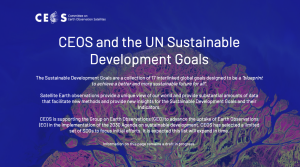Since 2016, the broad range of CEOS remote sensing coordination has included some activities that support the United Nations 2030 Agenda for Sustainable Development. The effort began as an ad-hoc team and transitioned to the CEOS SDG Coordination Group in 2021, which consists of representatives from a number of CEOS Agencies, current and past leadership, and the CEOS Executive Officer. The Coordination Group develops technical reports for four SDG sub-indicators, provides strategic direction, and assesses and coordinates external requests.
To be successful, a sustainable development agenda requires effective partnerships for implementation. In collaboration with the Group on Earth Observations (GEO), CEOS contributed to a report on how GEO and CEOS Agencies work with governments, academia, scientists, and the private sector to develop partnerships for implementation of Sustainable Development Goals.
CEOS also prepared a document to guide its activity in support of the SDGs: “What CEOS can do to support the U.N. 2030 Agenda and the SDGs”.
During GEO Week 2023, CEOS as a ‘GEO Participating Organization’, was awarded a GEO SDG Award in recognition of the SDG Coordination Group’s accomplishments over the past five years, in promoting the value of satellite data and the provision of useful material and technical user guides to increase and enhance space data access and uptake.
 Feature Page: CEOS and the UN Sustainable Development Goals
Feature Page: CEOS and the UN Sustainable Development Goals
CEOS has created a feature site to look at these priorities in more detail and to showcase the requirements; stakeholders; relevant missions; and tools, services, and derived products for each of these target SDG Indicators.
In addition, we have recently added a new table of EO enabling infrastructures that support SDGs. Check out the summary of those tools and their links.
The page can be accessed here.
Activities
CEOS has developed Earth observation ‘Support Sheets’ for four SDG indicators, to help countries utilise EO data for reporting to the SDG Framework. The EO support sheets cover relevant missions, sensors, methodology and tools available for reporting against each specific indicator. The support sheets are reviewed by experts annually, with updates online alongside CEOS Plenary in October or November.
In 2022, CEOS published a series of articles highlighting CEOS support for the SDGs, which can be found here:
CEOS Support to the UN Sustainable Development Goals
- CEOS Support to SDG 6: Clean Water & Sanitation
- CEOS Support to SDG 11: Sustainable Cities and Communities
- CEOS Support to SDG 14: Life Below Water
- CEOS Support to SDG 15: Life on Land
CEOS Earth Observation Handbook: 2018 Edition
The 2018 Special Edition of the Earth Observation Handbook – Satellite Earth Observations in Support of the Sustainable Development Goals – is the third thematic EO Handbook (preceded by the EO Handbooks on Disaster Risk Reduction and Climate). Coordinated by ESA on behalf of the CEOS Ad Hoc Team on SDGs, with valuable contributions from CEOS Agencies experts including JAXA, CSIRO, GEO and its Initiative on SDGs (EO4SDG), and the United Nations Committee of Experts on Global Geospatial Information Management (UN-GGIM), this 100-page Handbook promotes and showcases the contribution of Earth observations to the realisation of the 2030 Agenda on Sustainable Development, its goals and targets, and to the SDG Global Indicator Framework.
Leadership & Contact
The SDG Coordination Group receives strategic guidance from the SIT Chair Team. The group consists of a small number of thematic experts, who aim to coordinate inputs from their thematic areas to contribute to the larger CEOS support for the SDGs. Please contact the current SIT Chair with any questions, including on how to contribute.